Un-earthed subversive: planting potatoes, unearthing the past
Essay
Welcome! For those new here, On the Commons explores the ancient roots and ongoing consequences of private property and commodification—from the Doctrine of Discovery to ancient enclosures of the commons, and more—along with love for this world and being human in the middle of systems that often make such “being” difficult.
Last weekend I was at a gathering of Montana Master Naturalists, taking outdoor workshops on botany, geology, and meteorology to maintain my certification (which requires 8 hours of continuing education and 20 volunteer hours each year), followed by some time up in the mountains at a cabin built by my mother’s husband decades ago, where sandhill cranes danced in a snow squall and Moon washed the cloud-scrunched sky and snow-dusted mountains all night long. There’s no electricity there, which meant keeping the barrel stove fed with firewood all night, and also no light pollution. I was planning on writing about these places and some thoughts they prompted on land ownership and relationship, but having a conversation with my father yesterday had me thinking about this essay from last year on planting potatoes and his family’s survival in Russia during the Siege of Leningrad.

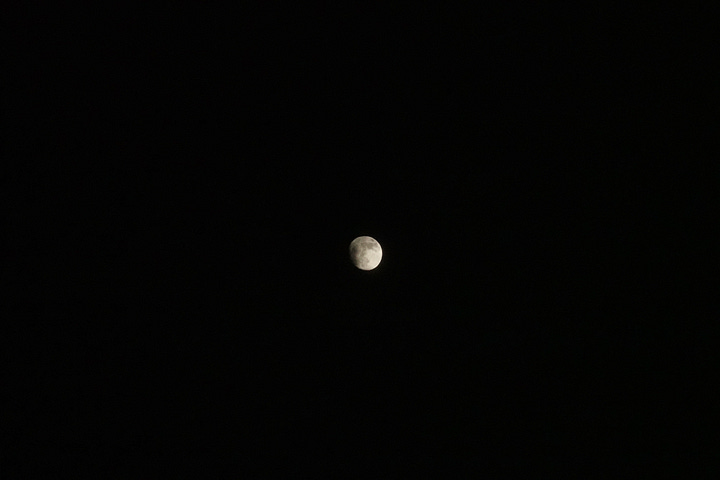
This is the third time I’ve thought of republishing a revised version of an older essay and found it was originally posted on the exact same date the previous year. Maybe as we each retune our attention and time to certain cycles of life and the world, we start to feel them within ourselves more intuitively. I hope so.
Audio version (the interview passages with my father and uncle are also now embedded within this audio essay):
Last week, on a warm day wedged among thunderstorms, chilly rain, and the thick, unwelcome smoke that drifted down from wildfires in Alberta, I finally got potatoes planted.
The seed potatoes, sliced in half and left to cure a few days earlier, tucked into the dirt like they were coming home. I scooped soil out of each hole and patted it back over, warm from the sun. The swallows were busy overhead—still investigating the nesting box but I’m not sure they’ll take it; as usual, they seemed more interested in the flicker-battered siding of my sister’s house next door.
A large bee roamed over a flowering lupine. A breeze went through the willows, firs, and hidden apple and plum trees across the road. A sound so constant I sometimes forget to notice it. Kneeling among the potato beds, I paused the planting to listen: the brush-scrape of the shovel into the compost pile, the birds and slight buzz of the bees, which will become more constant when the borage blooms and the dandelions pop up again; the high pitch of the hummingbird zooming up and fluttering down among the caragana; the shush-rustle of the trees; even the sound of the sifting dirt in my hand as I scoop out room for a potato and cover exposed worms.
I’m still sad at the loss of so many stored potatoes over December and January due to the cycle of intense cold and wind followed by warmer days of rain, but it’s a nice thing about living in a place where winter has a grip to loosen: the promise of renewal. I’m suddenly tracking the blossoms on the strawberries and planting seeds with an eye to autumn, reminding myself to save the beans and tomatoes until there’s no threat of frost. And we’ll have a chance with potatoes all over again.
I bought my seed potatoes late, which meant ending up with varieties I’m uncertain of because everything else was sold out, but even in the base soil of dense clay that makes up my garden, previous years’ potatoes keep showing up healthy and well-grown. With all the added compost, I’m hoping this year’s will come up even better, enough to easily feed the families that rely on this rectangle of land as long as I keep them watered and covered.

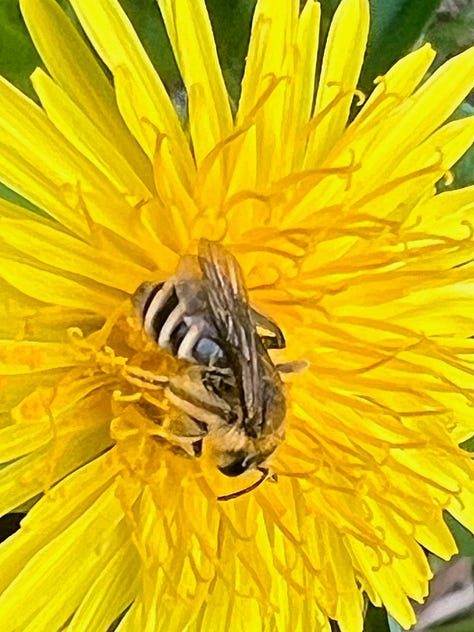

As I dug the potatoes in, pulled thistles, and checked on the clusters of radish seedlings, I thought a lot about my Russian grandmother and her time as a World War II evacuee in the Ural Mountains. How she fed her family, the stories I’ve heard about their existence on little but potatoes and mushrooms, their almost complete lack of meat. What would she have given then for this kind of abundance? For a valley so rich in food that even my purchased dirt now comes solely from a small business that picks up and composts local food waste?
In late August 1941, as Germany’s Army Group Nord closed in around Leningrad for what would turn out to be an almost 900-day siege, my grandmother was evacuated from the city with her two small children, my aunt and uncle. They were on posledni poezd, my father has told me, the last train out of the city.
Over a decade ago, I happened to be in St. Petersburg and had a chance to sit down with my father and his brother and record some of my uncle’s memories of this time, with my father translating because my uncle doesn’t speak English and my Russian is elementary at best. It might be the only conversation of that kind my family will ever have a record of, and listening again to their exchanges and infrequent laughter, even interrupted by my own occasional stumbling Russian and the sounds of my aunt in the kitchen, feels like a small treasure.
There is a lot of documentation about the siege (I recommend Anna Reid’s Leningrad over Harrison Salisbury’s The 900 Days but it depends on your taste), but I’d asked my uncle for stories because I wanted to have some feel for what my own family had been through. How my grandmother coped in that time.
There are only so many details you can glean generations-removed from any experience. My father and uncle both said that the adults who’d lived through the siege and its aftermath almost always refused to talk about it. Many hadn’t survived, and if they had, that was what they wanted to focus on—not uncommon among generations who’ve lived through enormous collective trauma.
Those of us who want some intimacy with the stories that live within us have to make do with what’s given. It never feels close to enough.
The train journey from Leningrad to a village a few kilometers from Kushva, around 1400 miles away on the far eastern side of the Ural Mountains, took a month. Eight families lived and cooked for that month in a shared freight car, picking up cold and boiling water whenever they stopped at a station. For the most part, my uncle Tolya said, they ate kasha. “Chyordnaya kasha. Ee belie.” Black kasha. And white. Tolya was five. His sister, my aunt Nela, was barely out of toddlerhood. Their father stayed in Leningrad to work at the factory and monitor communications until he ended up in a hospital after almost starving to death and then being bombed into the water on Lake Ladoga’s frozen Road of Life, and my own father wouldn’t be born for another few years.
“Black kasha,” or just “kasha,” is what we call buckwheat. I’ve had it in my uncle’s house served at breakfast or with dinner, steaming hot grains topped with a chunk of butter, laced with salt. Even decades after the Soviet Union fell and people no longer had to stand in long lines for the occasional sausages or bag of fruit, kasha was a staple I’d been accustomed to seeing for almost any meal.
In the 1940s, it was more than a staple. For Leningrad families sent to live as evacuees, kasha was their only caloric intake for a month. And it was far more than my grandfather and hundreds of thousands like him would shortly have to eat, left behind German lines to keep the Leningrad factories running and eventually dying of starvation and cold.
It was one of the most bitter winters Russia had ever experienced. Poor planning, Stalin’s willful ignorance of the realities of the coming battlefronts, and an early-on German bombing of one of the main storage depots had left Leningrad’s remaining residents on rations so scant that starvation starting setting in almost immediately.

Eventually, people were boiling leather for the nutrition. Eventually, they ate bread so high in sawdust as a replacement for flour they might as well have been chewing two-by-fours. Eventually, they starved to death—around 630,000 people over the course of the siege, though some estimates say it was closer to a million. In the first winter in particular it was so cold, and there were so many bodies, that survivors hauled their loved ones across town on children’s sleds to the cemetery where the corpses were stacked and piled in their thousands. I’ve been to that cemetery, overwhelmed at the vast space where the city’s starved are honored in long, endless-seeming rows.
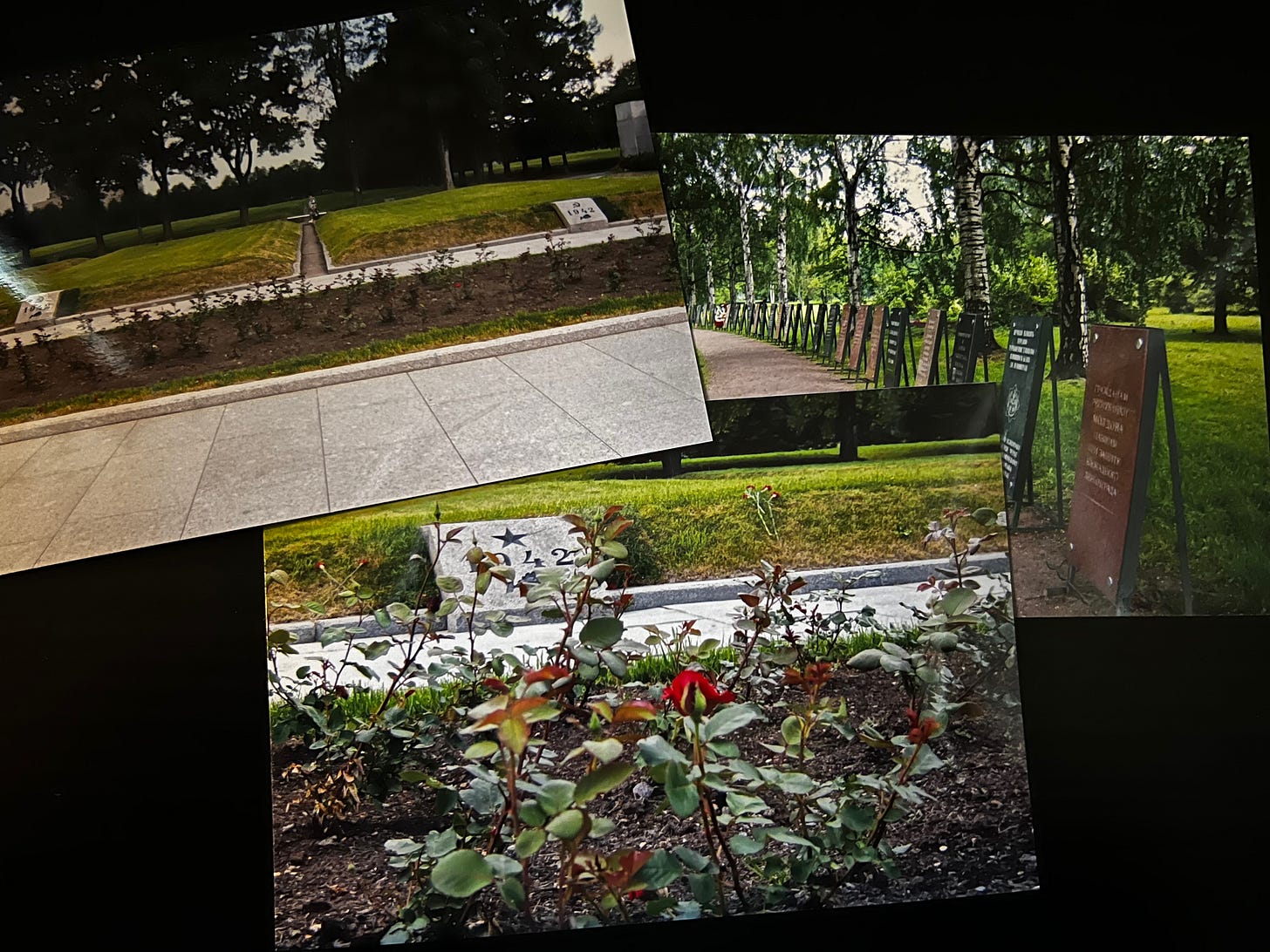
My family, like all the others, was boarded in the village with a local family—who resented, even hated, their presence—and were given a plot of land to grow potatoes: two meters by one hundred. “They lived off the land, basically, survived on the land,” my father and uncle told me. “People could live more or less fed only if they have their own potatoes.” My grandmother grew potatoes, chopped wood, and foraged for mushrooms in between working on the factory line as a metallurgical engineer.
“She had bloody hands.”
Transcribing my father’s translation of that line, which my uncle says matter-of-factly, I remembered the first time I ever met my grandmother, when I was fourteen: the tiny pastries she made to welcome us; my younger sister and I helping to make meat-filled pilmeni in her tiny Leningrad apartment where even the stairwell smelled of cucumbers.
These two clips are of my father and his brother talking about the family’s food situation during their years living as evacuees in the Ural Mountains. The first is about potatoes and gardening; the second is about lack of meat. Correction to my own translation attempts on that second one: lard isn’t beef fat; it’s rendered pork fat. Suet is beef fat.
Bloody hands.
My hands are in no such condition after curing and planting potatoes and moving four yards of compost. Sometimes I get blisters working in the garden or weed-whacking along the neighbors’ fences, and am frequently stabbed by thistles, but I can wear gloves if I need to, and nobody’s survival is dependent on my cultivation.
Starvation has been used as a tool of empire and colonialism, and provoked as the consequences of war, for thousands of years. When I dig and plant in this garden, it’s with a lot of pleasure, but also with a constant sense of wrongness, knowing that my own family, my maternal grandfather’s family, was able to move to the region that now makes up Montana as a result of theft, betrayal, deceit, and government-enforced starvation that too few are aware of.
Starvation is not a hard state to provoke in Russia, where the phrase “agriculturally marginal” has been applied by many historians. The history of that place, and of its leaders reaching for rich, fertile soil in lands like Ukraine, can’t help but evoke questions of how we survive in the places we live, what “survival” even means, much less balance or sustainability. What is currently called Russia is a vast land where many different peoples have lived for thousands of years, and yet the story of the land and peoples is still dominated by the mythologies of a nation shaped by an aggrieved sense of inherited exceptionalism and a constant grasping for something more.
Potatoes, which are ubiquitous in Russian households, didn’t even arrive in the country until the late 1600s, over a century after they were introduced to Europe. They were called “devil’s apples” (supposedly because people didn’t know how to grow or cook them, and ended up eating them green or uncooked, which caused illness), and mandates to cultivate potatoes in the mid-1800s led to massive but finally unsuccessful riots by imperial and state peasants—most of them serfs, people legally owned by the tsar and the state. I often wonder what Russian serfs survived on before potatoes were accepted as a food (grains, mostly, which often failed), but the reality is that, like the people who stayed in Leningrad under siege and had no potatoes to cultivate, many didn’t.
The abundance that I’m able to plant in a garden, which will come back to me and others many times over, belies a story of scarcity, of hardscrabble and want. It clashes up against what I know of my grandmother’s bloody hands and of how my uncle helped his own grandmother raise carrots, peas, and beets in a small vegetable plot next to that metallurgical factory in the Urals. It defies my own memories, even, of the Soviet Union and early post-Soviet Russia, all the babushkas sitting on upturned buckets selling the produce of their rural dacha gardens: tomatoes, small pickling cucumbers, sunflower seeds wrapped in a cone of newspaper.
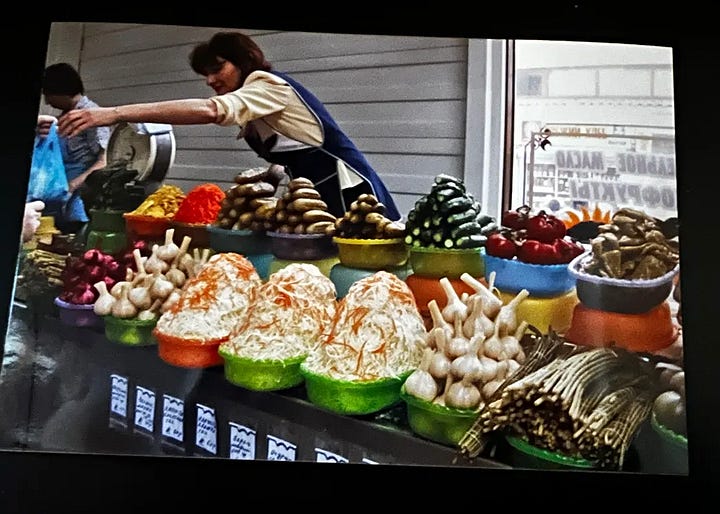

I haven’t seen a kercheifed woman sitting on a bucket by the sidewalk selling herbs or tomatoes in decades, but I can still smell the fronds of dill, still taste the sunflower seeds between my teeth.
It’s perennially interesting to me that many of the foods associated most closely with Russia—as well as with much of Europe—originally came from what are currently called North and South America. What is a Russian identity without a handful of sunflower seeds to crack open or potatoes to peel? Borscht is all I can think of—made from beets, which originally came from the Mediterranean region, thrive in cold climates, and are remarkably versatile.
Yesterday I planted some sunflowers. Pulled quackgrass out from around the raspberries and turned over a little soil, poked the seeds in the ground. Hesitated over pinching off some strawberry runners and ran my fingers over the potato leaves already up among the peas—we must have missed some last fall when harvesting the potatoes, and here they are making more food, not only unasked, but without my having put in any extra work. Their appearance reminded me of my mother-in-law in England telling me how she and her husband were still finding potatoes in a spot they’d first planted them decades previously.
Potatoes feel subversive, food cached for urgent needs and uncertain futures. Someone in that village in the Ural Mountains is probably still finding potatoes my grandmother planted.
I wonder if she ever got a chance to smell the dirt she bled over while digging potatoes. If she ever got to pause between working at the factory and laboring for her family’s survival to listen to the birds, or rest her feet under a rustling aspen grove. I wonder if she longed for meat and bread, if she had the energy to cry at night while her children slept.
My grandmother’s life was never anything but hard, but like many people with hard lives she knew how to welcome laughter and invite joy. Almost all the photos I’ve seen of her show a smile playing in the corners of her mouth. I’d give a lot to be able to feed her a plate of potatoes I’ve grown, chop the wood for her, let her sit in the sun and watch the bees bobble in the lupine and the swallows chasing magpies away from their nest.
I wonder what it would take to have a world where everyone has access to what we need for survival, and nobody has to bleed for it.


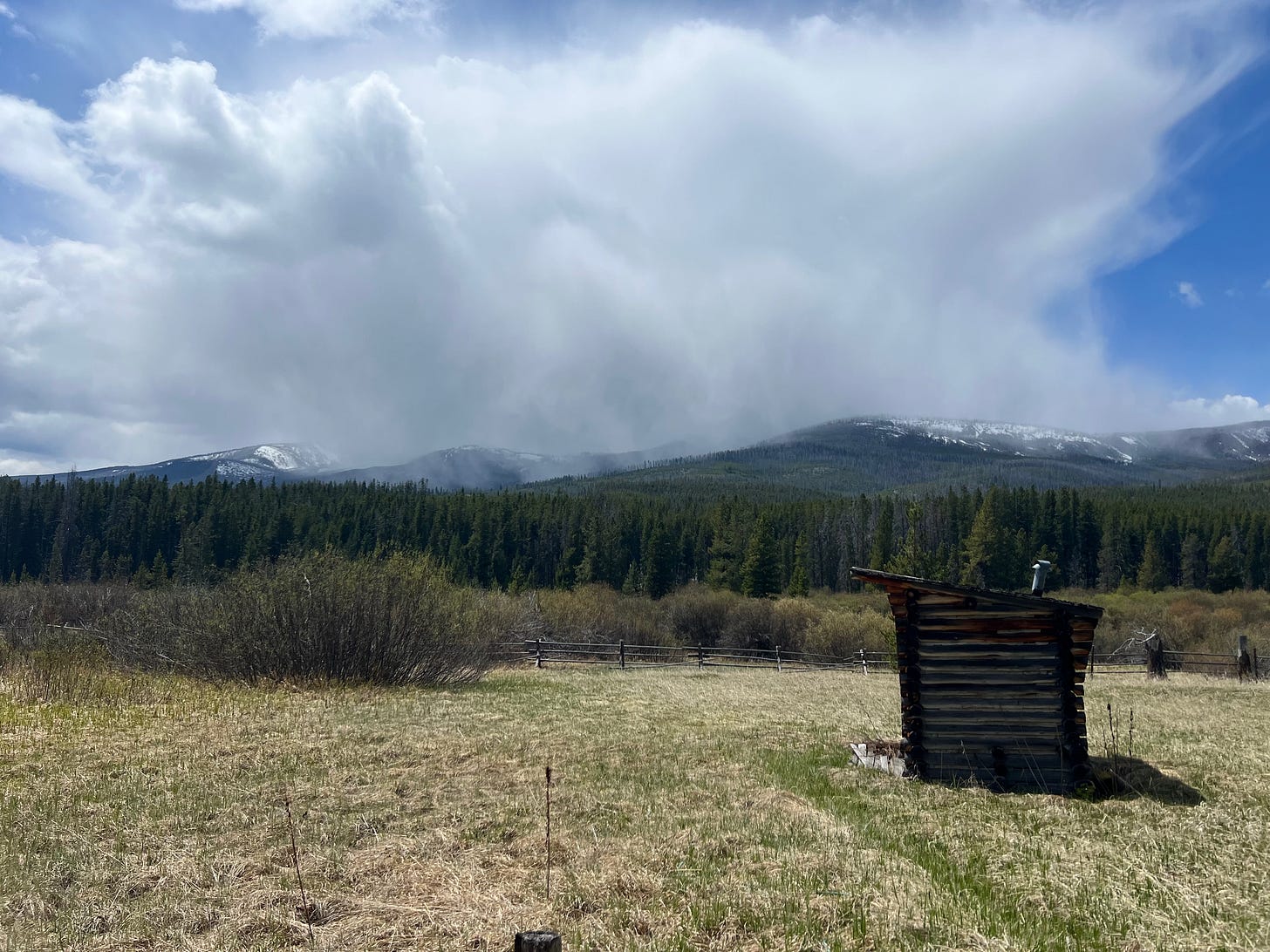
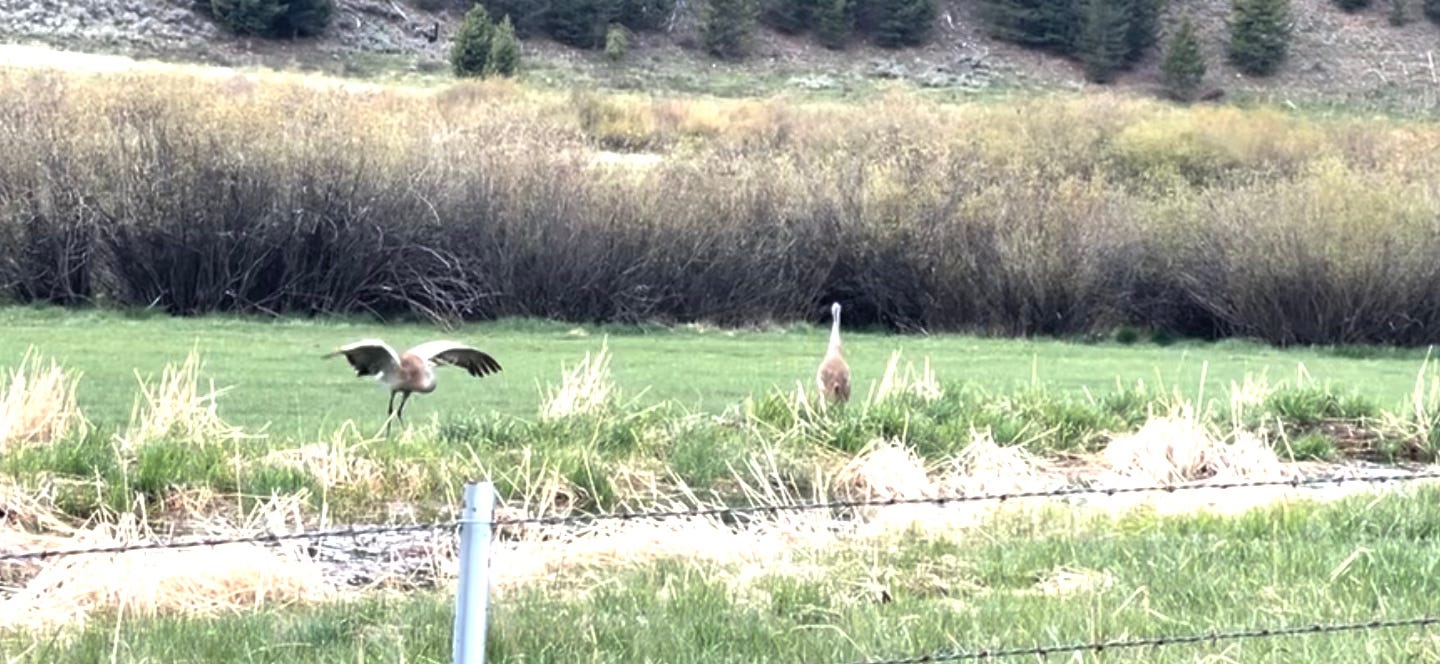
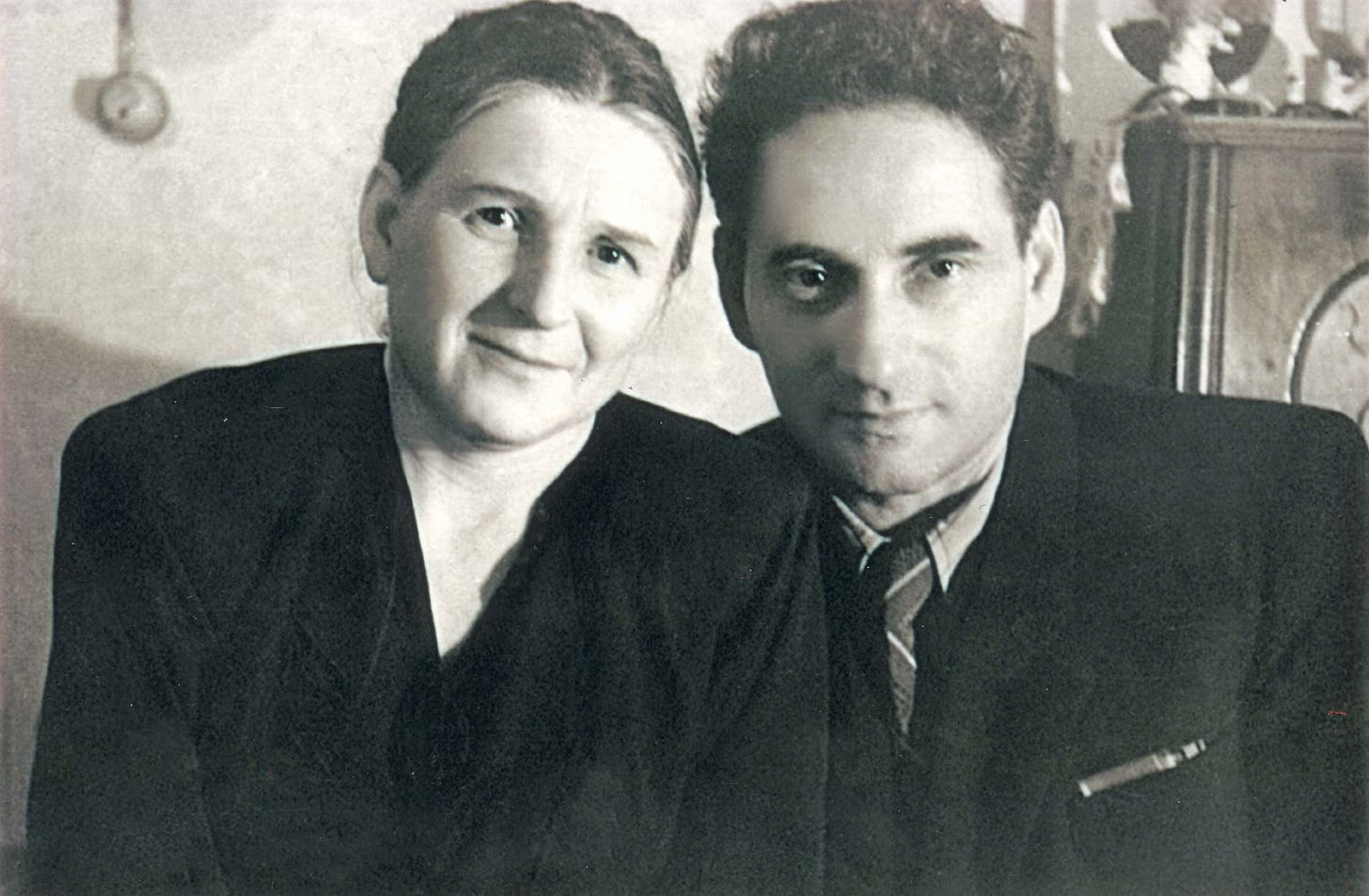
Oh, Antonia. This is so beautifully written, which such important questions. This sentence struck me: "What is currently called Russia is a vast land where many different peoples have lived for thousands of years, and yet the story of the land and peoples is still dominated by the mythologies of a nation shaped by an aggrieved sense of inherited exceptionalism and a constant grasping for something more." I had to re-read, to make sure you were writing about Russia and not the US. I think that until/unless people with an aggrieved sense of exceptionalism can release that (and their mythologies) and stop grasping for something more, we are never going to have a world in which some don't have to bleed to meet their needs for survival. I'm so glad you included the photo of your grandparents, so we could see that smile. So she could be real for us in a different way.
I love buckwheat, but I plant it as a cover crop, to fix nitrogen and compete with the Bermuda grass in my little quarter-acre plot. I don't think I've ever managed to harvest any. I mostly buy it in soba noodle form. Sometimes I can sneak a little into pancakes.
Your bit about people not knowing what to do with potatoes reminds me of a story my dad told me about a similar situation during the Depression (which lasted longer in rural areas). When the feds started handing out free grapefruit, the country folk tried every method they could think of to cook it, including frying it, and never really came up with anything good.